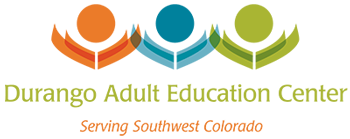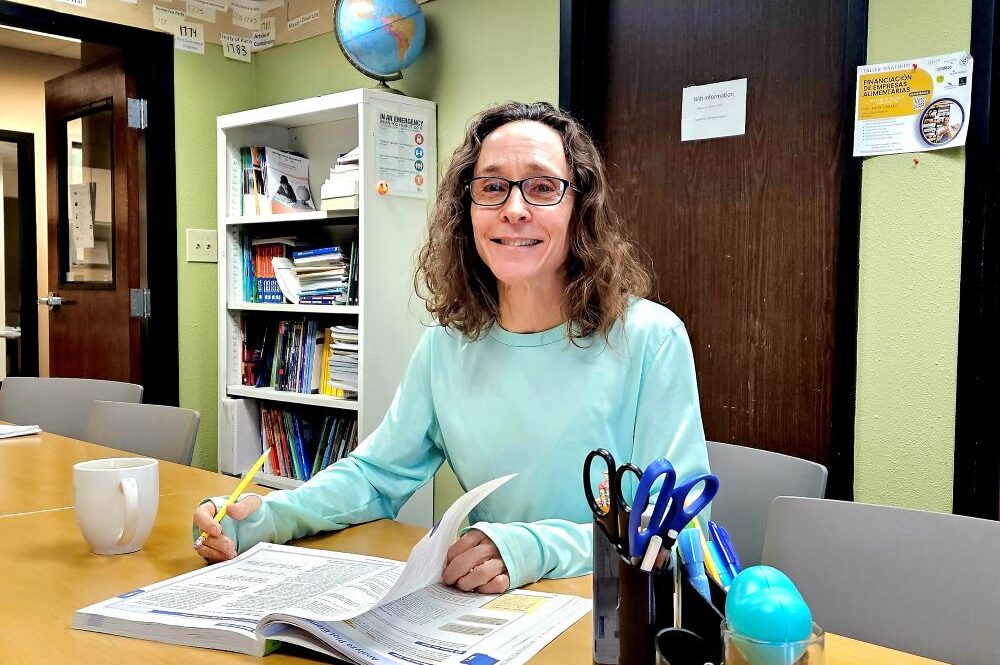AEC Teachers Prep for Adult Learners Coming Back to School
The animal loomed over Cyd Franken. Its massive body and thick muscles eclipsed her small, lean frame. Cyd remained resolute in the pen. She would not force the animal to be friendly. In fact, she would not force it to be or do anything.
Instead, she inhaled deeply and exhaled slowly. As she did so, she relaxed her body and her thoughts.
And just like that, the horse eased its tension. Its body language made it clear Cyd could now approach and offer some much needed scratches and pats.
“All the communication with horses is nonverbal,” Cyd explains. “You have to learn to read the horse. You have to let go of all your preconceived notions of how this should be, how this should go, what should happen. You have to be open to them relaxing in your presence.”

Cyd Franken approaches her horses (and her teaching) with empathy and support.
Working with horses shapes Cyd’s interactions with people. Especially her students at the Adult Education Center in Durango. She notes, “Horses are very stoic animals. We have a lot of students who are also very stoic because education has been traumatic for them. They come in very guarded. Horses are also like that. They are a prey animal and you are a predator. So you have to be really relaxed and open with them. You have to be willing to adapt to them.”
In essence, it’s all about earning trust.
For six years, Cyd has instructed morning and afternoon classes for Social Studies and Reading & Language Arts at the Adult Education Center in Durango. She also teaches these topics to inmates at the La Plata County Jail as they work to complete their education.
Her students can range in age from older teens to middle-aged adults. Despite their differences in age and stages of life, all the students share a common goal: they must attain a GED, which is equivalent to a high school diploma. Obtaining a GED requires taking a battery of four difficult subject tests in Math, Reading & Language Arts, Science, and Social Studies.
Individuals without any kind of diploma must often settle for low-wage jobs. They are further barred from fruitful careers because they are ineligible to apply for military service or secondary education. According to the U.S. Bureau of Labor Statistics, people see a 25% boost in wages after attaining a GED. Research conducted in 2022 also revealed that people without diplomas suffered the highest unemployment rates.
Cyd sees the gap of a complete education as a burden that only gets larger and heavier the more time passes. “I’m always so surprised at how it gets so much harder as you get older,” she says. “There’s a lot more pressure on adults. Where am I gonna live? What am I gonna eat? Where’s my food coming from? Just even those small, incremental things you have to think about—like paying your bills—just make it a little more difficult [to focus and commit in classes]. There’s a greater sense of urgency for older students to have a GED.”
As a result, the HSE (High School Equivalency) program is committed to targeted and tailored instruction. As Cyd explains, “The goal is not to waste anyone’s time. We are really trying to give them access to the greater world and not having their GED is a barrier for them, which we are trying to pull down. And the idea is to pull it down as quickly and efficiently as possible because life is happening to them now: They have children. They have jobs. They run businesses. They have responsibilities. They have families to care for. They are the only source of transportation for others.”
Steady assessments are one way the Center creates an individualized and efficient learning environment. Students are pre-tested when they register for classes. These entry tests determine the level of skills and knowledge students already possess. It reveals which skills and knowledge they may lack or need to strengthen. This data helps all HSE teachers craft individualized lessons for each student. They know exactly which topics and concepts to target. Time in the classroom is then split between group lessons or activities, one-on-one time with the teacher, and independent time when a student can work at their own pace through different assignments.
AEC teachers have also integrated technology into their curriculum. “We’re using the Aztec learning platform. We can use it in the classroom but it can also be used at home by students who want to accelerate their learning. We can monitor what they’re doing and see their scores and data on the skills they’ve mastered and whether they are ready for testing,” Cyd states.
The AEC’s tutoring program is another standout asset. Cyd points out, “All of our tutors are volunteers so it’s free to the students. If they are showing up and participating in class and they need that extra help, we can get them tutors once or twice a week and it really accelerates their learning to have that one-on-one hour to work on very specific skills.”
As a caring learning community, AEC takes a holistic approach to removing any and all barriers students face when seeking equitable education access. For instance, the Center provides hot meals and childcare for its students. The BOOST program helps students secure anything from eyeglasses and bus passes to car repairs and college scholarships. On-site advisors will also refer them to the vast array of broader community resources available through other nonprofits.
Cyd supports not only her students, but also the entire HSE team, serving as the Lead High School Equivalency Teacher. That means she provides support and guidance to all the Center’s HSE instructors. She says, “I’m in charge of monitoring their professional development, their hours, and checking in – making sure everybody has the resources and materials they need.”

Cyd reviews today’s lesson plan before her students arrive
At the moment, the teaching team is focused on back-to-school preparations. Inside her classroom, Cyd flips through a workbook. She scours the pages with an eraser.
“Darn it! These are my marks!” She laughs. “I tell students to not write in the workbooks, but then look what I did!”
How Cyd prepares for a new semester of teaching has changed over the years. “I don’t spend as much time prepping lesson plans as I used to because I’ve been here a while now,” she grins. “I’ve learned the material so well and I’ve created so many different lesson plans that I can respond to whatever comes up in my classroom today. I can respond to who is there and what they need.”
In many ways, the students are her teachers. By working with them, Cyd has been able to transform her perspectives on what teaching is or how to do it better. “I have learned to be very flexible and empathetic. Just having a lot of empathy for the disarray of students’ lives and a lot of the trauma they bring with them into the classroom. I could use that as a way to better my communication skills and better my teaching skills. How do I connect with them in a way that’s non-threatening and support them in the ways that they want to be supported?”
Test scores. Measurable gains graphs. Learning percentiles and statistics. These are not what put the giddy-up in Cyd’s passion for teaching. She only feels like a truly successful teacher when the students reach their own goals. “They show you when they are succeeding. They are so elated when they pass tests.”
Registration for GED and ESL (English-as-a-Second-Language) classes runs August 2nd – 16th, 2023. Simply call 970-385-4354 in Durango or 970-564-7004 in Cortez to get started on your journey towards livable wage careers, higher education, and social and economic mobility.


